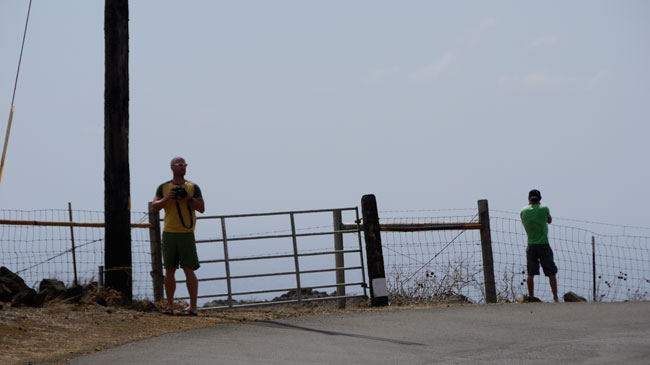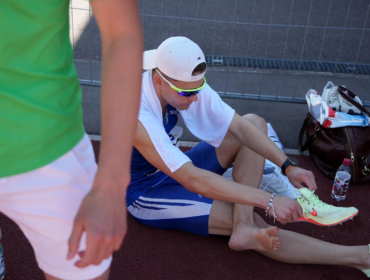There are only 9 weeks left until Kona. The IRONMAN world championship on the Big Island, Hawaii is for many an athlete the highlight of his or her career that one should enjoy. I am not talking about pro athletes, for them it is an obligation and in many ways not a question of joy. But for the many age groupers racing there should be joy. Be it as it may, it is hard work to get to Hawaii and it is hard work to finish there. Many currently linger along this very thin red line between overreaching and overtraining, and try to solve the riddle how to achieve peaking on time.
Working with biestmilch and being a physician I am confronted with a lot of health issues of athletes and it is exactly now, that I receive these posts and comments talking about the discrepancy, the lacking proportionality between training efforts and performance. You may feel in top form, you worked hard for many weeks, and then when the day comes, you feel sluggish in the swim or toasted on the bike already. Maybe you overlooked the discrete signs that guide you along the path of productive and unproductive workouts. In this post I would like to start writing about the various symptoms that may give you a frame of reference and standpoint of where you are with your training, symptoms that may help you to assess your very personal body condition.
Sebastian Kienle told me before Challenge Roth: “Well, I don’t feel really perfectly prepared, but you know it, if you feel perfectly prepared, then it may as well be the case that you did too much.” You may know that Sebastian got 2nd in his 1st long-distance race and that he raced under 8 hours. To remember his sentence could help in situations of doubts.
To fall prey to overtraining can happen to everybody who loves his or her sport, because sport can actually become an addiction which has nothing to do with being overzealous or doped. The feeling of whole body fatigue as well as the feeling of being able to deliver peak performance are rewarding and seducing. Both extremes can lure us to do more to get more! One day “the more” turns into “too-much” and can bring about overtraining, a sneaky process that may overrun you! A complex phenomenon that needs elucidation still.
Overreaching we need, overtraining we have to avoid
How I see it is that training is the physiological healthy process of improving performance (that applies not only to sport, training is a process of learning to change behavior, be it mental or physical), whereas there are general and individual limits to achievements, of course. With exercise you stimulate and activate the respective parts of the body, including your brain/mind. Without stimuli we become lazy and fall apart, we are losing grounds, and finally develop into losers. We need training, we need exercise to live and survive, but have to learn to respect our very own limits that are rooted in our genetic outfit.
Out there in the real world we observe all transitions from healthy and fit to frail and finally sick. In the beginning the symptoms of decline are very sound, and easily overheard… and if we don’t listen, suddenly the steep fall is there and it may take us weeks, sometimes months, and sometimes for ever to recover.
The very signs that mark the transition from overreaching to overtraining
Generalized fatigue, heavy legs, sore muscles, recurrent headaches, diarrhea, weight loss, sexual disinterest, loss of appetite, problems to sleep and getting up in the morning, inability to relax, listlessness, generalized swelling of lymph glands, worsening of allergies and asthma. Coming down with colds and flus, or respiratory infections that resist to therapy. And very important to pay attention to despite hard training racing performances continue to deteriorate.
This is only an incomplete list that wants to show that the changes you may experience can be emotional, behavioral or physical, and that they are all interconnected. They are all phenomena that depending on their severity are part and parcel of fatigue due to necessary overreaching or an indicator of overtraining.
The symptoms usually should disappear after taking a rest of 24 to 48 hours. If you cannot make it in this time, be cautious it’s overtraining knocking at your door.
Give me the one and only reason!
One more remark I want to make before I close this too long post, and continue to go into the biology of overdoing in greater detail in a later one. Athletes love to go for blood testing, x-rays, MRT etc. They search for the physician and they search for the parameter that is giving them the one and only explanation for their failing. I have to disappoint you. There is none. At the time you will receive concrete results of your bloodwork or other diagnostics you may already be gone over board, which means when your blood shows something you are really sick, and physical workouts are not any longer an option. It is the very characteristic of incipient overtraining that our diagnostic means fail. Overtraining is first of all a phenomenon of a stress system out of balance, a stress system that involves the immune system, the nervous system (central and autonomic nervous system) and hormones such as cortisol and adrenaline. These systems control and regulate our whole body, more about that in another post.
In the end, say good bye to conventional diagnostics, and don’t get lulled by weird interpretations of sophisticated diagnostics. Overtraining is a syndrome that can mimic all kind of diseases, be they mental or physical, and this is due to the systems that are involved – and to cut a long story – it involves our whole body as does training before you crossed the line to overtaining.






Great article and very relevant. As someone who certainly treads close to the line of over-training I’m well aware of the risks.
I hope Sebastian Klein’s comments prove true for me at ITU Long Distance Worlds on Sunday. After a hard period over-reaching I have had two weeks that feel far too easy! I feel like I must have let fitness slip away!
I’ll be taking my Biestbooster on race day to see if it gives me the edge!
Russ
Hi Russ, have a great race tomorrow. Hopefully you succeed to go with the flow, if you don’t want too much, you can achieve a lot… better undertrained than overtrained says Chris “MACCA” McCormack.
Keep my fingers crossed, and I shall follow the race tomorrow as close as possible!
Best wishes, susann
Great article. I was diagnosed 2.5 years ago with Chronic Ulcerative Colitis and I have ofetn wondered if it could have been caused or catalysed by constant overtraining.
My Gastroendocrinologist says it is not the root ( sole ) cause but may very well have assited the disease surfacing.
Thanks for posting a quality read.
Terry